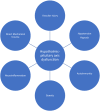Endocrine Dysfunction After Traumatic Brain Injury: An Ignored Clinical Syndrome?
- PMID: 36788181
- PMCID: PMC10689524
- DOI: 10.1007/s12028-022-01672-3
Endocrine Dysfunction After Traumatic Brain Injury: An Ignored Clinical Syndrome?
Abstract
Traumatic brain injury (TBI) incurs substantial health and economic burden, as it is the leading reason for death and disability globally. Endocrine abnormalities are no longer considered a rare complication of TBI. The reported prevalence is variable across studies, depending on the time frame of injury, time and type of testing, and variability in hormonal values considered normal across different studies. The present review reports evidence on the endocrine dysfunction that can occur after TBI. Several aspects, including the pathophysiological mechanisms, clinical consequences/challenges (in the acute and chronic phases), screening and diagnostic workup, principles of therapeutic management, and insights on future directions/research agenda, are presented. The management of hypopituitarism following TBI involves hormonal replacement therapy. It is essential for health care providers to be aware of this complication because at times, symptoms may be subtle and may be mistaken to be caused by brain injury itself. There is a need for stronger evidence for establishing recommendations for optimum management so that they can be incorporated as standard of care in TBI management.
Keywords: Adrenal insufficiency; Growth hormone deficiency; Hypopituitarism; Hypothalamic-pituitary dysfunction; Pituitary dysfunction; Traumatic brain injury.
© 2023. The Author(s).
Conflict of interest statement
None of the authors have any conflicts of interest.
Figures


References
-
- Robba C, Bacigaluppi S, Bragazzi N, Lavinio A, Gurnell M, Bilotta F, Menon DK. Clinical prevalence and outcome impact of pituitary dysfunction after aneurysmal subarachnoid hemorrhage: a systematic review with meta-analysis. Pituitary. 2016;19(5):522–535. doi: 10.1007/s11102-016-0733-2. - DOI - PubMed
Publication types
MeSH terms
LinkOut - more resources
Full Text Sources
Medical

